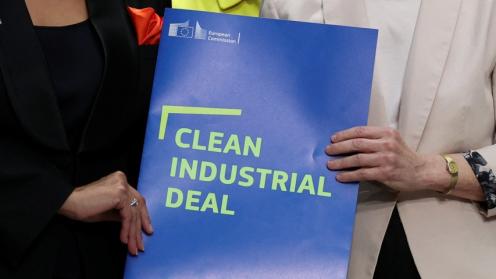The European Commission’s new state aid framework must not weaken support for renewable hydrogen by supporting fossil hydrogen with carbon capture
Today GH2 wrote to the European Commission expressing concerns with its proposal to introduce allow blue hydrogen to benefit from government support (“state aid”). Our submission to the consultation is here.
The aim of this European Clean Industrial Deal State Aid Framework, is “to accelerate the roll-out of renewable energy, deploy industrial decarbonisation and ensure sufficient capacity of clean tech manufacturing in Europe” “by enabling Member States to provide support – where needed – to accompany the ambitions of the Clean Industrial Deal without causing undue distortions of competition in the Single Market" so said EU Executive Vice President Teresa Ribera launching the draft rules back in March. “We must and will stay the course on the goals set out in the European Green Deal” President Ursula von der Leyen said last year, a theme she returned to when she announced the Clean Industrial Deal itself in February: “it will turn the tide in clean energy”.
These promises are not fully reflected in the draft state aid rules. The proposal is to treat government support to renewable green hydrogen and fossil fuel-based hydrogen with carbon capture in the same way for projects which involves both renewable and fossil-fuel based hydrogen.
Overall, President von der Leyen and Vice President Ribera’s leadership on the energy transition has been extraordinary. There is much that is good in the Clean Industrial Deal and its suggested framework for state aid. It is however not acceptable to include options for blue hydrogen to receive state aid where until recently green hydrogen was only eligible for support.
Renewable green hydrogen and its derivatives are still in an early stage of development, and struggling to compete with fossil-fuel based incumbent supply chains.
The draft document emphasises “respecting the principle of technology neutrality”. There is sound logic in this. When the aim is decarbonisation, we shouldn’t focus on which specific technology we use to achieve emission reductions. The problem is that we will actually not achieve decarbonisation with fossil-fuel based hydrogen, even if carbon capture is used. It will lock in the use of gas, will promote and maintain oil and gas infrastructure and deepen fossil fuel dependency.
Carbon capture may well have a role to play in the decarbonisation of some industrial processes, particularly for essential products with limited decarbonisation options, such as cement.
Even some of the staunchest supporters of gas-based hydrogen with carbon capture acknowledge that for carbon capture to play a meaningful role it has to be with a capture rate of well in excess of 90 %, above 95 % really, come with gas production with just about no methane leakage and with carbon storage that is truly permanent. No such blue hydrogen is produced yet. The carbon capture technology it requires is not proven at scale.
It is fine if Europe wishes to support the development of carbon capture. But it has not yet rigorously defined low carbon hydrogen. Until this is done and done in a way that is genuinely low carbon, it is flawed to introduce state aid provisions for blue hydrogen.
The draft rules on state aid note that considerable investment will be needed for Europe's decarbonisation effort. Yes, our industry needs certainty and a fair chance to compete with fossil fuel incumbents. By allowing governments to subsidise the use of fossil fuel and long-established supply oil and gas supply chains, the Commission runs the risk of sending the signal to the renewable industry that it prefers to stay in the oil and gas era.
At an Energy Security Summit in London this week, von der Leyen crossed the Channel to underline the need for Europe to reduce its dependence on fossil fuels. The most significant plans for carbon capture are outside of Europe. It will not bring energy security or a clean deal for Europe to undermine renewable energy on the continent by accepting state aid for oil and gas projects elsewhere.
Europe needs an ambitious energy transition. It is necessary for the climate and for growth. To open the door to support for gas based hydrogen makes a mockery of Europe’s commitment to a clean deal and would undermine the growth of the green hydrogen sector.
Jonas Moberg,
CEO, GH2
